Dental Implant in Tel Aviv
Search and Compare the Best Clinics and Doctors at the Lowest Prices for Dental Implant in Tel Aviv
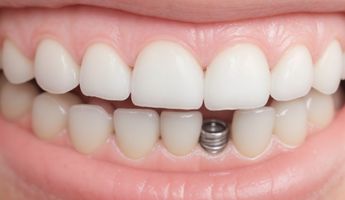
Find the best clinics for Dental Implant in Tel Aviv
No pricing info available
Vietnam offers the best prices Worldwide
Price: $ 1
Dr. Ratner's Dental Clinic, located in Arison New Hospitalization Building, Tel Aviv, Israel offers patients Dental Implant procedures among its total of 55 available procedures, across 2 different specialties. Currently, there's no pricing information for Dental Implant procedures at Dr. Ratner's Dental Clinic, as all prices are available on request only. All procedures and treatments are undertaken by the lead specialist at the Dental, and they are not accredited by any recognized accreditations institutes
Udental, located in Arison New Hospitalization Building, Tel Aviv, Israel offers patients Dental Implant procedures among its total of 38 available procedures, across 2 different specialties. Currently, there's no pricing information for Dental Implant procedures at Udental, as all prices are available on request only. All procedures and treatments are undertaken by the lead specialist at the Dental, and they have multiple recognized accreditations, including: CQC - Care Quality CommissionGDC - General Dental CouncilCQC - Care Quality CommissionMDU - Medical Defence UnionBACD - British Academy of Cosmetic DentistryAccreditation Programme of Health OrganizationBDA - British Dental AssociationGDC - General Dental CouncilADI - Association of Dental ImplantologyBSDHT - British Society of Dental Hygiene and TherapyBACD - British Academy of Cosmetic DentistryMDU - Medical Defence UnionInvisalign ProviderBSOI - British Society of Oral ImplantologyBDA - British Dental Association Practice Scheme Gold MemberBSOI - British Society of Oral ImplantologyBDA - British Dental AssociationADI - Association of Dental ImplantologyBSOS - British Society of Occlusal StudiesBSOS - British Society of Occlusal StudiesBSDHT - British Society of Dental Hygiene and Therapy
Compare Before & After Photos of _procedure_photos.phpDental Implant

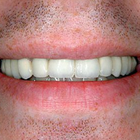
Front view


Front view
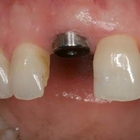
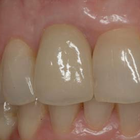
Front view
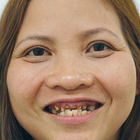

Front view

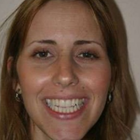
Front view
WHY US?
At Medijump, we're making medical easy. You can search, compare, discuss, and book your medical all in one place. We open the door to the best medical providers worldwide, saving you time and energy along the way, and it's all for FREE, no hidden fees, and no price markups guaranteed. So what are you waiting for?

Free

Best Price

Widest Selection

Risk-Free
What you need to know about Dental Implant in Tel Aviv

A dental implant is a medical device that provide support to artificial teeth. It's surgically placed into the jaw to act as a replacement for the root of a missing or damaged tooth, which in turn serves to hold a replacement tooth or bridge. It functions and looks much like a real tooth, restoring your ability to chew and improves your overall appearance. Dental implant surgery is considered as a better alternative to dentures or bridgework that does not fit well. It also offers a great option for people when they do not have enough natural teeth roots left to build denture or bridgework replacements.
Since dental implants eventually fuse with your jawbone over the span of several months, it won’t make noise, slip, or cause bone damage the way dentures or bridgework might. Dental implants also enable natural speech, look and feel like your own teeth, make eating easier, and improves your appearance. However, the surgery may involve several stages, and, in some cases, it may require two separate visits to the clinic to complete. Ensure to look for a specialist in a reputable clinic for the best results.
What is the cost of Dental Implant in Tel Aviv?
Price differences abound in Tel Aviv for Dental Implant based on the clinic, the proficiency of the surgeon, and the individual requirements of the patients. It's essential to realize that dental insurance usually doesn't cover the entire bill for this treatment, though it might cover a part. Several dental clinics provide finance schemes or payment alternatives to assist in easing the financial burden. For more precise cost estimates, reach out to your dental service provider or a nearby clinic.
What does a Dental Implant Procedure Involve?
Dental implant surgery generally requires several stages. Each stage may be performed under general or local anesthetic. The first stage is removing the damaged tooth. Then, if your jawbone is too soft or not thick enough, your dentist may perform bone grafting to create a more solid base for the implant. The bone graft may be natural (taken from another part of your body) or synthetic (a bone-substitute material). If you only need minor bone grafting, the implant surgery can be performed on the same day. However, if you need a significant amount of bone graft, the implant surgery may have to be postponed until the transplanted bone grows enough new bone to support the dental implant.
The next stage after the damaged tooth removal and bone graft (if you need one) is placing the dental implant. To do this, your dentist makes an incision to expose the bone and puts the metal implant post deep into the bone. At this stage, you will still have a gap where your tooth is missing. Your dentist will place a temporary denture for appearance. Once the metal implant post is placed, osseointegration begins. This is a process where the jawbone grows into the surface of the implant and can take several months to complete. After osseointegration is complete, your dentist will place the abutment, which is a small connector post that will hold your new tooth. The final stage, after the abutment is placed, is placing the crown, which is the tooth-looking part. You can choose between a removable crown and a fixed crown.
How Long Should I Stay in Tel Aviv for a Dental Implant Procedure?
The length of your stay in Tel Aviv for a Dental Implant depends on numerous considerations like the intricacies of the procedure, the quantity of implants required, and your personal recovery process. Each stage of dental implant surgery is done in separate appointments. After each appointment, you should be able to leave the hospital or clinic right away. However, you should stay in Tel Aviv for at least 2 weeks for completion of the work, the initial recovery time, and follow-up checkups.
What's the Recovery Time for Dental Implant Procedures?
The recuperation duration following a Dental Implant or dental implant operation can widely vary and is shaped by multiple aspects. Initial healing of the tissue might require only a handful of days, but complete osseointegration (the fusion of the implant with the jawbone) generally spans several months. This window could be extended for patients requiring auxiliary procedures such as bone grafts, or those with prevailing health issues that may impede the healing process.
Post-procedure, it's not unusual to experience a degree of discomfort, which could manifest as minor pain, swelling of your gums and face, skin and gum bruising, and slight bleeding. Such symptoms are a standard phase of the recovery process and should alleviate within a fortnight. In this interim, it's advisable to stick to a soft diet to not overload the implant site with undue pressure. Any strenuous physical exertion should be put off to circumvent potential complications.
Maintaining excellent oral hygiene is paramount to facilitate healing and stave off infection. Regular brushing and flossing, being particularly gentle around the surgical area, coupled with rinsing your oral cavity with warm saline water, can contribute to keeping the region hygienic.
What sort of Aftercare is Required for Dental Implant Procedures?
After each stage of surgery, you may have to eat soft foods. Since you may experience swelling, bruising, pain, and minor bleeding, your dentist will prescribe pain medications or antibiotics to help ease your discomfort. During your recovery period, you need to avoid smoking as it can contribute to implant failure and complications.
No special care is required for dental implants. Nonetheless, you need to practice good oral hygiene in order to maintain the implant and your remaining natural teeth. Make sure to brush your teeth twice a day, floss daily, and rinse your mouth with an antiseptic mouthwash. You also need to see your dentist regularly and avoid damaging habits, such as chewing hard items.
What's the Success Rate of Dental Implant Procedures?
The efficacy of Dental Implant, alternatively referred to as dental implants, in Tel Aviv, is typically impressive, boasting effectiveness percentages as high as 98% in some studies. This positions dental implants as one of the most reliable procedures within dental care's realm. Nevertheless, it's worth mentioning that the success rates might fluctuate, influenced by several factors.
The patient's overall health is a key determinant of the thriving outcome of a dental implant procedure. Individuals exhibiting optimal health usually witness higher success rates. Pre-existing health issues like diabetes, osteoporosis, and periodontal ailments can theoretically impact the efficacy of the implant.
Additional contributing factors to the success rate encompass the quality and abundance of the individual's bone structure. Patients boasting plentiful, healthy bone are ordinarily the perfect candidates for dental implants. However, those who have experienced bone loss might need to undergo a bone grafting procedure before the implant procedure. This step can provide a robust base for the implant and enhance the chances of a successful result.
Are there Alternatives to Dental Implant Procedures?
If you are not a candidate for dental implant surgery, or you simply do not want to undergo the procedure, you can opt for the alternatives. The alternatives include:
- Mini dental implants, which is a small type of dental implants. The structure is similar to regular dental implants, but are somewhat smaller in size. Unlike regular dental implants, dentists can often place mini implants only in one visit using local anesthesia. You may also be able to use your new teeth on the same day.
- A same-day implant is essentially similar to traditional dental implants. However, your dentist performs the whole process in just one day, skipping the process of wound healing and osseointegration.
- Implant-supported dentures or All-on-4 is an alternative if you need to fix a complete upper or lower set of teeth. During this procedure, four to six implants are placed into your jawbone as a base to attach and stabilize your denture.
What Should You Expect Before and After the Dental Implant Procedure?
Grasping what lies ahead before and post the Dental Implant can lessen potential worries and guarantee you are fully equipped for the upcoming journey. Prior to the procedure, your dental practitioner will conduct an all-inclusive dental assessment. This check-up may encompass dental X-rays and sophisticated 3D imaging to examine the status of your oral cavity.
The dental professional will also explore your medical history. If you're suffering from specific heart disorders or orthopedic implants, your dental practitioner might suggest antibiotics to avert infection. A personalized treatment blueprint, customized to your circumstances, will be constructed. This strategy takes into account factors like the amount of teeth you need substituted and the state of your jawbone. The procedure is typically carried out under local anesthesia to mitigate any discomfort.
Subsequent to the operation, experiencing slight unease is usual. You might witness inflammation of your face and gums, discoloration of your skin and gums, soreness at the insertion area, and insignificant bleeding. Your dental specialist will recommend medications to soothe these indicators. In case inflation, unease, or any other complications intensify in the days post-operation, it's crucial to reach out to your oral surgeon. Post-operation will require you to consume mushy foods as the operated site recovers. Moreover, you'll be guided to abstain from smoking, as it can hinder recovery and influence the triumph of the dental implant.
Following the positioning of the implant, the healing process, and fusion with the bone (osseointegration) transpire over an extended period. During this interval, maintaining robust oral cleanliness is vital. This involves frequent brushing, the use of dental floss, and cleansing with an antibacterial mouthwash. Periodic dental examinations are obligatory to track progress and confirm the well-being and effectiveness of the implant.
What are Potential Risks of Dental Implant?
Despite Dental Implant boasting remarkable effectiveness, it is, as any surgical operation, not without risks and potential difficulties. The chances of encountering these issues are often minute and irregularities are infrequent, yet it remains critical for patients to comprehend these possibilities before undertaking the procedure.
Complications and side effects may include:
- Implant failure
- Nerve injury
- Infection
- Sinus problems
- Damage to surrounding structures, such as other teeth or blood vessels
How long does a Dental Implant last?
The durability of a Dental Implant is heavily reliant on the individual's oral cleanliness and general wellbeing. Nonetheless, with appropriate upkeep and care, dental implants have the potential to stand the test of time. The titanium pillar inserted into the jawbone during surgery is crafted to be everlasting, while the dental cap fastened to the anchor may necessitate substitution every decade or decade and a half due to normal usage. Yet, with outstanding dental management and habitual screenings, the cap has the potential for lifelong endurance.
Whilst the information presented here has been accurately sourced and verified by a medical professional for its accuracy, it is still advised to consult with your doctor before pursuing a medical treatment at one of the listed medical providers
No Time?
Tell us what you're looking for and we'll reachout to the top clinics all at once
Enquire Now

Popular Procedures in Tel Aviv
Prices Start From $1

Prices Start From $1

Prices Start From $48

Prices Start From $1

Prices Start From $1

Prices Start From $11

Prices Start From $1

Prices Start From $45

Recommended Medical Centers in Tel Aviv for Dental Implant

- Interpreter services
- Translation service
- Religious facilities
- Medical records transfer
- Medical travel insurance
- Health insurance coordination
- TV in the room
- Safe in the room
- Phone in the room
- Private rooms for patients available

- Interpreter services
- Translation service
- Religious facilities
- Medical records transfer
- Medical travel insurance
- Health insurance coordination
- TV in the room
- Safe in the room
- Phone in the room
- Private rooms for patients available

- Interpreter services
- Translation service
- Religious facilities
- Medical records transfer
- Medical travel insurance
- Health insurance coordination
- TV in the room
- Safe in the room
- Phone in the room
- Private rooms for patients available

- Interpreter services
- Translation service
- Religious facilities
- Medical records transfer
- Medical travel insurance
- Health insurance coordination
- TV in the room
- Safe in the room
- Phone in the room
- Private rooms for patients available
Dental Implant in and around Tel Aviv
About Tel Aviv
Tel Aviv-Yafo commonly referred to as just Tel Aviv, is the economic and technological center of Israel. Located on the Israeli Mediterranean coastline, the city is popular for its glimmering beaches, creative culture, non-stop nightlife, and architectural heritage. As Israel is becoming a popular medical tourism hub, thousands of medical tourists who seek medical treatments in this country choose Tel Aviv as their destination. The city’s medical system, as well as its doctors and medical professionals, are world-renowned. It boasts some of the finest medical centers, staffed with highly trained doctors and nurses. International tourists looking for world-class, innovative medical treatments can get any procedure they need for a fraction of the cost they would have to pay in their home countries.
Popular Parts of Tel Aviv
There’s no shortage of activities in Tel Aviv. With at least 300 days of sun per year, this hip and bustling city offer shimmering beaches for any sun-chaser. Gordon Beach is one of the most popular in the city. It boasts clear blue waters, volleyball courts, and a boardwalk full of restaurants serving fresh fish and Israeli cuisine. Besides the beaches, visitors usually go to the Tel Aviv Museum of Art. This impressive gallery is set inside the modern ‘envelope’ building by American architect Preston Scott Cohen. The museum provides a lot of activities and collections to see, but the highlight is the collection of Impressionist and post-Impressionist art, which features works by Pissarro, Renoir, Monet, Picasso, Van Gogh, and many more. Visitors who want to relax can visit Park HaYarkon, which is the city’s largest green space.
Transport in Tel Aviv
International tourists will arrive at Ben Gurion Airport, which is located 20 kilometers southeast of Tel Aviv. It serves flights to and from many cities around the world, including Seoul, Amsterdam, New York, and Beijing. The city’s relatively new overground railway system is the most affordable and easiest way to get around. Buses are available, but the routes can be a bit confusing. Taxis are widely available around the city and they are easy, albeit expensive, way to get around.
Visas in Tel Aviv
Holders of passports issued by 99 countries, including all EU countries, Canada, Russia, and the US can enter and stay in the country for up to 3 months without a visa. Most other nationals are required to obtain a visa prior to arrival and are recommended to contact their nearest embassy of Israel as some countries need a confirmation from the Israeli government before a tourist visa is issued.
Weather in Tel Aviv
Tel Aviv experience a typical Mediterranean climate. The winters are rainy and the summers are hot. The temperatures in the summer (June to August) can rise to 31°C - 34°C and the humidity can reach over 80%. Spring and fall have pleasant weather since the temperatures are not too high or low.
Additional Info
- Local Currency: New Israeli Shekel (ILS) is the official currency. 1 USD will get you approx. 3.5 ILS.
- Money & Payments: It’s easy to find ATMs around the city. Credit cards are widely accepted. Tipping is common, but typically not expected.
- Local Language: Hebrew is the official language, while Arabic has a special status as a semi-official language. Most people can speak English fairly well.
- Local Culture and Religion: Most of the population adheres to Judaism. Islam is the largest minority religion in the city, followed by Christianity.
- Public Holidays: The city celebrates several public holidays, such as Independence Day, Hanukkah, and Jerusalem Day.
Popular Searches
- Plastic Surgery in Thailand
- Dental Implants in Thailand
- Hair Transplant in Thailand
- Breast Augmentation Thailand
- Gastric Sleeve in Thailand
- Gender Reassignment Surgery in Thailand
- Laser Hair Removal in Bangkok
- Botox in Bangkok
- Dermatology in Bangkok
- Breast Augmentation in Bangkok
- Coolsculpting in Bangkok
- Veneers in Turkey
- Hair Transplant in Turkey
- Rhinoplasty in Turkey
- Stem Cell Therapy in Mexico
- Rhinoplasty in Mexico
- Liposuction in Mexico
- Coolsculpting in Tijuana
- Rhinoplasty in Korea
- Scar Removal in Korea
- Gastric Sleeve in Turkey
- Bone Marrow Transplant in India
- Invisalign in Malaysia
- Plastic Surgery in the Dominican Republic
- Tummy Tuck in the Dominican Republic
- Plastic and Cosmetic Surgery in Poland
- Rhinoplasty in Poland
- Hair Implant in Poland
- Dental Implants in Poland
- IVF in Turkey

